高中英语教案选修7 《Unit 4 Sharing 单元回归评价单》04
【范文】人教版高中英语选修7教案Unit 4 Sharing
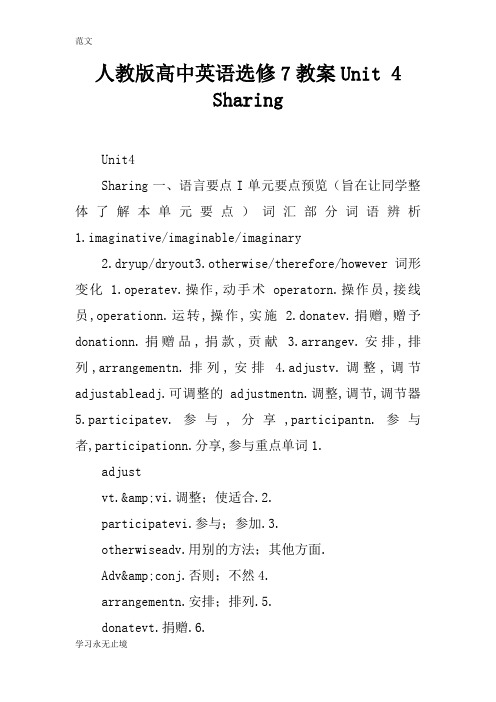
人教版高中英语选修7教案Unit 4SharingUnit4Sharing一、语言要点I单元要点预览(旨在让同学整体了解本单元要点)词汇部分词语辨析1.imaginative/imaginable/imaginary2.dryup/dryout3.otherwise/therefore/however词形变化 1.operatev.操作,动手术operatorn.操作员,接线员,operationn.运转,操作,实施 2.donatev.捐赠,赠予donationn.捐赠品,捐款,贡献 3.arrangev.安排,排列,arrangementn.排列,安排4.adjustv.调整,调节adjustableadj.可调整的adjustmentn.调整,调节,调节器5.participatev.参与,分享,participantn.参与者,participationn.分享,参与重点单词1.adjustvt.&vi.调整;使适合.2.participatevi.参与;参加.3.otherwiseadv.用别的方法;其他方面.Adv&conj.否则;不然4.arrangementn.安排;排列.5.donatevt.捐赠.6.purchasevt.&n.买;购买.7.distributionn.分配;分发;分布状态.8.relevantadj.有关的,相应的9.operatev.操作,运转,开动,起作用重点词组dyingto.极想;渴望.theotherday几天前stickout.伸出inneed.在困难中;在危急中.重点句型1.whenIreachtheschoolgroundstherearelotsof “goodmorning”formefromtheboys.2.youaskedwhetherI’mgettingtoknowanylocalpeople.3.Thegiftcoversthecost ofexercisebooksandtextbooksforcommunityprimaryschoo lsthatoperateinpoororremotevillages.重点语法限制性定语从句II词语辨析1).imaginative/imaginable/imaginaryadj.【解释】imaginative富有想象力的,创新的imaginable可想象得到的imaginary想象中的,虚构的【练习】选择imaginative/imaginable或imaginary并用其适当的形式填空1)Althoughthemaincharactersinthenovelaresotruetolif e,theyare_______.2)It’s_______forsuchan_______writertocreate_______storie s.3)Thisistheonlysolution_________.4)Thefamouspoemwasfroman______poet.keys:1)imaginary2)imaginable;ima ginative;imaginary3)imaginable4)imaginative2).dryup /dryout【解释】dryup使完全变干;(河流,湖泊等)干涸dryout变干,干透【练习】选择dryup或dryout,并用其适当的形式填空1)Thefarmerspumpedwatertotheirfieldstostopthesoil__ ______.2)Thepool________inthelateautumn.3)Thevillag ershadtowaitforthesunto_________thedirtroad.4)Don’tleavethevegetableonthetable,oritwill________.keys: 1)dryingout2)driesup3)dryup4)dryout3)otherwise/ther efore/however【解释】otherwise否则;不然thereforeadv.因此,所以however无论如何,可是【练习】选择otherwise/therefore或however并用其适当的形式填空1)Hedidn'tworkhardatEnglish_______hewouldn'tfinditd ifficulttolearnnow.2)wedonothaveenoughmoney._____ ____wecannotaffordtobuythenewcar.3)Thefirstpartwas easy;thesecond,________,tookhours.4)Heisnoisy,but________aniceboy.5)weweregoingtoplayfootball,butitwassohotthatwedecidedtodo_____________.keys:1 )otherwise2)Therefore3)however4)otherwise5)otherwiseIII词性变化(旨在提供语法填空所需材料)1.operatev.操作,动手术operatorn.操作员,接线员,operationn.运转,操作,实施2.donatev.捐赠,赠予donationn.捐赠品,捐款,贡献 3.arrangev.安排,排列,arrangementn.排列,安排 4.adjustv.调整,调节adjustableadj.可调整的adjustmentn.调整,调节,调节器5.participatev.参与,分享,participantn.参与者,participationn.分享,参与【练习】根据句子结构,用括号内所提供词的适当形式填空1)Theyencouragedthe_______to_______inthesingingperf ormanceafterthecontest..2)Thedoctorare________onan______ofafactorywhogotinjuredwhen_______amachine,and the________issaidtolastovertenhours.3)Theseatsinthe planeare________,andyoucan________themtoacertainang le.The______isnotdifficulttomake.4)Thedrinkswere________tothembycocacolacompanyandtheyreceived_______f romothercompaniesaswell.5)ourdepartmentwillbeinchar geof_______theconference.wouldyoupleasegiveussomesu ggestionsonthe_______forit?keys:1)participants;part icipate2)operating;operator;operating;operation3)ad justable;adjust;adjustment4)donated;donation5)arran ging;arrangementIV重点词汇(旨在提供综合运用所需材料)1.adjustvt.&vi.调整;使适合.[重点用法]adjustmentn.调整;修正adjustableadj.可调节的;可调整的adjust使适应;适应。
人教版高中英语选修7Unit 4Sharing教案4
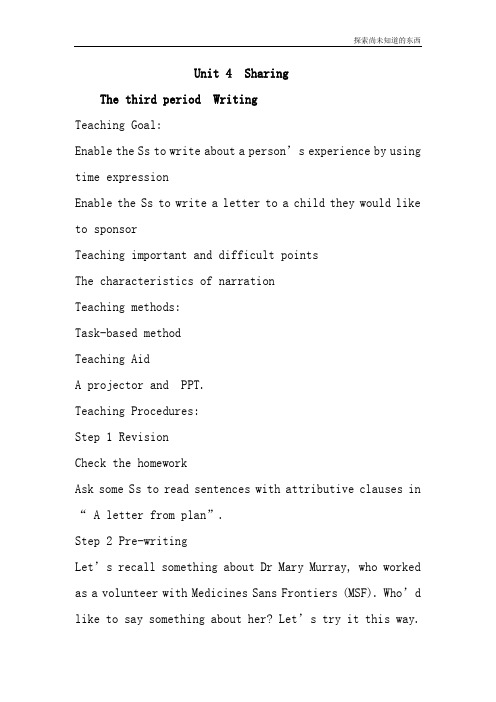
Unit 4 SharingThe third period WritingTeaching Goal:Enable the Ss to write about a person’s experience by using time expressionEnable the Ss to write a letter to a child they would like to sponsorTeaching important and difficult pointsThe characteristics of narrationTeaching methods:Task-based methodTeaching AidA projector and PPT.Teaching Procedures:Step 1 RevisionCheck the homeworkAsk some Ss to read sentences with attributive clauses in “ A letter from plan”.Step 2 Pre-writingLet’s recall something about Dr Mary Murray, who worked as a volunteer with Medicines Sans Frontiers (MSF). Who’d like to say something about her? Let’s try it this way.Each of you is given the chance to say only one sentence about Dr Mary Murray. OK, begin. Of course, you can have an attributive clause in your sentenceDr Mary Murray was a volunteer, who worked with Medicines Sans Frontiers (MSF).Dr Mary Murray once worked in clinic in both Malawi and Sudan which are developing countries in AfricaStep 3 WritingVery good. Now you are asked to write about Dr Murray for the school magazine. Write a paragraph on each topic below in the order shown. Remember to use time expressions listed on Page 35.Points must be included:1.who she is2.reasons why she joined MSF3.what she did in Malawi4.what she did in the Sudan5.the effects on her of her experiences.6.her plans for the futureStep 4 Writing taskDeal with writing task on Page75.Imagine that you have decided to sponsor Shanshan, a11-year-old girl from Gansu province. Her family cannot afford to keep her at school. But she loves practicing English. Write a letter to her in English. In your letter, you can:Introduce yourselfSay something about your interests and hobbies Described your familyLet her know you want to make friend with her and her from herOther things you would like to tell her.After the Ss have finished writing, ask several of them to read their letters.Sample writing:Dear Shanshan,I’m a student of Guangzhou No.1 senior High School, Guangdong province. My English name is Steve, and I like English very much. Maybe I can help you to continue with your school.I go to school everyday except on Sundays. Every morning, we have four lessons, including P.E., arts, music. I like sports very much, especially football .Whenever I’m freeI would play football with my classmates. I also enjoy reading English papers, which gives me great delight, and helps improve my studies.I have a small family. There are father, mother and I. Mum often cooks delicious food for me. And Dad usually encourages me to study hard in order to serve the country and people better. I think so. So I work very hard at my lessons.I’m looking forward to hearing from you. I want to know what you need badly so that I know what I can do fro you .Don’t hesitate to ask for what you want. I will try to help you Yours sincerelySteve Step 5 AssignmentAsk Ss to polish the letter they wrote in class and hand it in tomorrowFeedback:Feed back:教学重点突出,内容安排充分。
人教版高二英语选修7Unit4Sharing全单元教案
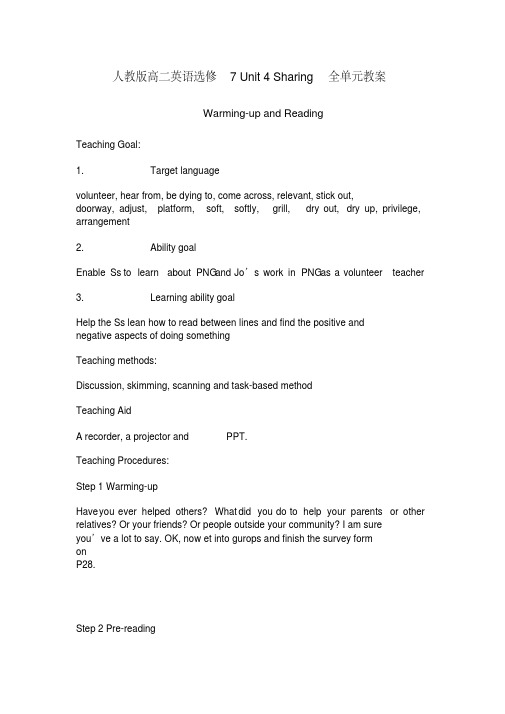
人教版高二英语选修7 Unit 4 Sharing 全单元教案Warming-up and ReadingTeaching Goal:1. Target languagevolunteer, hear from, be dying to, come across, relevant, stick out,doorway, adjust, platform, soft, softly, grill, dry out, dry up, privilege, arrangement2. Ability goalEnable Ss to learn about PNG and Jo’s work in PNG as a volunteer teacher3. Learning ability goalHelp the Ss lean how to read between lines and find the positive andnegative aspects of doing somethingTeaching methods:Discussion, skimming, scanning and task-based methodTeaching AidA recorder, a projector and PPT.Teaching Procedures:Step 1 Warming-upHave you ever helped others? What did you do to help your parents or other relatives? Or your friends? Or people outside your community? I am sureyou’ve a lot to say. OK, now et into gurops and finish the survey formonP28.Step 2 Pre-readingAsk Ss to find out PNG on the map and disucuss the photos in the reading passage.Step3 Reading1. ScanningScanning the text and fill the blanks with their names.1._____ is a young Australian woman.2.________ was dying to hear all about Jo’s life in PNG.3._______ walked a long way to get to school.4.___________ didn’t have any textbook.5._____ became a lot more imaginative when teaching.6._____ started jumping out the windows during achemistry experiment.7.________ v isited a village that was the home o f one the boys, Tombe.8._____ started crying “ieee ieee” to welcome them.9._____ led us to a low bamboo hut.10._____ was going to share the platform with Jenny and Jo.11.________ softly talked to each other in their language Jodidn’t understand2. Skimming the text and find the general idea of each paragraph.3.detailed reading Task-based (ex1 in comprehending part.Type of houseFamily relation-shipsCooking methodsSleeping arrange-mentsType of houseFamily relation-shipsCooking methodsSleeping arrange-mentsStep IV.HomeworkSuppose you've graduated from a key university and now y ou are a volunteer who works in the remote region to assit the basic education there. Andyou are to write a letter home to introduce your present situation. (youcan refer to the text).Extensive ReadingTeaching goals:1. Enable the Ss to know the purpose of a website called“world gifts” and give their opinions on it.2. Enable the Ss to learn about the international welfare programmer called “Plan International” and a child who has been sponsored through it.Teaching important and difficult points:Get the Ss to realize that they should make the most of what they own and do something for the poor.Teaching method:Task-based method and fast readingTeaching aids:A recorder, a projector, a compute connected to the Internet.Teaching procedures:Step I.RevisionDictation eight sentences, each contain the vocabulary they ‘ve learned in this unit.Step II. Pre-reading“Have you ever tried to send a gift to the children in poorareas or countries? Probably not. Today, we can have access to a website, where you can send your gifts to those who are in great need. Please glance quickly at the Internet page on Page 33, and answer the followingquestions.1. What does the page show you?2. Where is the list of gifts?3. In what kind of order are the gifts listed? How much arecheapest and dearest gift?4. where is the gift card?5. What do the photos show you?Step III. Careful ReadingReading carefully.And the task is to finish Ex2 on page 34.Discussing What do you think of this website and its idea? Do you thinkpeople will get interested in it and buy its gifts? Do you think thosegifts listed are really helpful? Now turn to page 34. Discuss the topicsin Ex 3 in groups. Choose one of the topics to discuss.Step IV. Reading TaskDeal with reading task in the work book.We have talked about the Chinese welfare programmer Project Hope whichhelps children in poor areas go back to school. In the world, there aremany organizations or programmers that help different groups of peoplein one way or another. Today, we will get to know another organizationcalled Plan International. Turn to page 73,. This is a letter from Rosannato some students. Rosanna works as a volunteer of Plan International inan area of Ecuador. Why did she write to the Ss? What did the Ss do? Read the letter and find the answers. While reading, summarize the topic ofeach paragraph and finish Ex on page74.Step V. Homework1. Ask Ss to search for information about Plan International.2. Pick out the sentences with attributive clauses in “ A letter from Plan”.WritingTeaching Goal:Enable the Ss to write about a person’s experience by using time expression_r_rEnable the Ss to write a letter to a child they would like to sponsorTeaching important and difficult pointsThe characteristics of narrationTeaching methods:Task-based methodTeaching AidA projector and PPT.Teaching Procedures:Step 1 RevisionCheck the homeworkAsk some S s to read sentences w ith attributive clauses in “ A letter from plan”.Step 2 Pre-writingLet’s recall something about Dr Mary Murray, who worked as a volunteerwith Medicines Sans Frontiers (MSF). Who’d like to say something about her? Let’s try it this way. Each of you is gi ven the chance to say only one sentence about Dr Mary Murray. OK, begin. Of course, you can have an attributive clause in your sentenceDr Mary Murray was a volunteer, who worked with Medicines Sans Frontiers (MSF).Dr Mary Murray once worked in clinic in both Malawi and Sudan which are developing countries in AfricaStep 3 WritingVery good. Now you are asked to write about Dr Murray for the school magazine. Write a paragraph on each topic below in the order shown.Remember to use time expression_r_rs listed on Page 35.Points must be included:1. who she is2. reasons why she joined MSF3. what she did in Malawi4. what she did in the Sudan5. the effects on her of her experiences.6. her plans for the futureStep 4 Writing taskDeal with writing task on Page75.Imagine that you have decided to sponsor Shanshan, a 11-year-old girl from Gansu province. Her family cannot afford to keep her at school. But sheloves practicing English. Write a letter to her in English. In your letter, you can:Introduce yourselfSay something about your interests and hobbiesDescribed your familyLet her know you want to make friend with her and her from herOther things you would like to tell her.After the Ss have finished writing, ask several of them to read theirletters.Sample writing:Dear Shanshan,I’m a student of Guangzhou No.1 senior High School, Guangdong p rovince. My English name is Steve, and I like English very much. Maybe I can helpyou to continue with your school.I go to school everyday except on Sundays. Every morning, we have four lessons, including P.E., arts, music. I like sports very much, especially football .Whenever I’m free I would play football with my classmates.I also enjoy reading English papers, which gives me great delight, andhelps improve my studies.I have a small family. There are father, mother and I. Mum often cooksdelicious food for me. And Dad u sually encourages me t o study hard in order to serve the country and people better. I think so. So I work very hardat my lessons.I’m looking forward to hearing from you. I want to know what you needbadly so that I know what I can do fro you .Don’t hesitate to ask for what you want. I will try to help youYourssincerelySteveStep 5 AssignmentAsk Ss to polish the letter they wrote in class and hand it in tomorrow.。
人教版高二英语选修七Unit4 Sharing教案设计
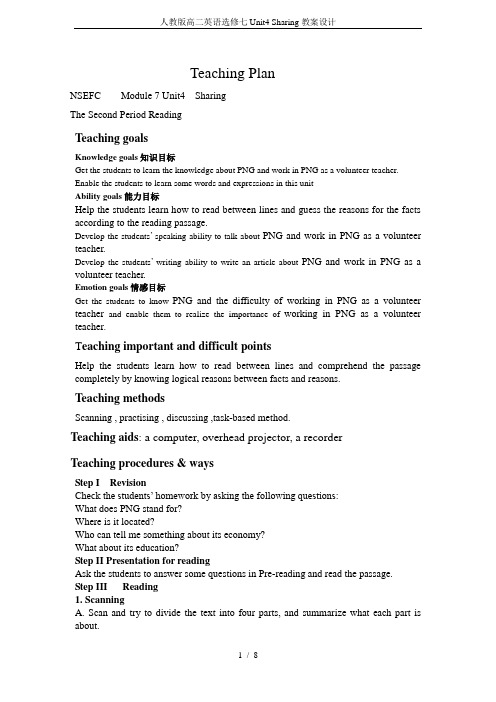
Teaching PlanNSEFC Module 7 Unit4 SharingThe Second Period ReadingTeaching goalsKnowledge goals知识目标Get the students to learn the knowledge about PNG and work in PNG as a volunteer teacher. Enable the students to learn some words and expressions in this unitAbility goals能力目标Help the students learn how to read between lines and guess the reasons for the facts according to the reading passage.Develop the students’ speaking ability to talk about PNG and work in PNG as a volunteer teacher.Develop the students’writing ability to write an article about PNG and work in PNG as a volunteer teacher.Emotion goals情感目标Get the students to know PNG and the difficulty of working in PNG as a volunteer teacher and enable them to realize the importance of working in PNG as a volunteer teacher.T eaching important and difficult pointsHelp the students learn how to read between lines and comprehend the passage completely by knowing logical reasons between facts and reasons.Teaching methodsScanning , practising , discussing ,task-based method.Teaching aids: a computer, overhead projector, a recorderTeaching procedures & waysStep I RevisionCheck the students’ homework by asking the following questions:What does PNG stand for?Where is it located?Who can tell me something about its economy?What about its education?Step II Presentation for readingAsk the students to answer some questions in Pre-reading and read the passage.Step III Reading1. ScanningA. Scan and try to divide the text into four parts, and summarize what each part is about.B. help the students to master the basic forms of a letter writing.2.Careful readingRead paragraphs 2-7 and then do the exercise.Step IV PracticeA.Find words in the passage that have the following meaning.B.Learn the following words or phrases by heart and complete the paragraph.stick out, come across, hear from, platform,(be) dying toStep V Post-readingDeveloping : I. guessingGuess the reasons for the facts according to the reading passage.Developing : II. discussionAsk the students to discuss the following question in group:Why do you think Jo became a volunteer in PNG?(Give as many possible reasons as you can.)Give the students a sample of the discussions :A: I think, first of all, Jo was a kind-hearted woman, who is willing to help others. Second, she knew enough about the poor conditions in PNG and thought that she could help teach in the schools. If I am given the chance, I will do whatever I can to help.B: In my opinion, Jo must have worked as a teacher in Australia, and she applied to become a volunteer abroad, and then she was sent to PNG as a volunteer.C: Maybe she thinks that education is the key to solving all the problems in PNG, so she, as a teacher, goes to PNG to help.Homework1. Finish Exercise 3 on Page 31.2. Read the passage again after class and find all the attributive clauses in it.3.Recite the key sentences in the text.教学流程图:Recite the following phrases and sentences after class:1.stick out 伸出e across 偶然发现或遇到;碰见3.hear from 接到……的信4.(be) dying to 极想;渴望5.in need 在困难中6.adapt (oneself) to 适应,适合7.for sure肯定如此,毫无疑问8.make a difference有关系;起(重要)作用9.dry up(河流,湖泊)干涸;(使)枯竭10.dry out(使)变干;(把)弄干11.adjust to 适应12.in the night在夜间1). I know you’re dying to hear all about my life here.2). I’ve included some photos which will help you picture the places I talk about.3). Tombe’s father, mukap, led us to his house, a low bamboo hut grasssticking out of the roof----this shows it’s a man’s house.4). When I reach the school grounds there are lots of “good mornings”for me from the boys, many of whom have walked a long way, sometimes up to two hours, to get to the school.5). In fact , I wonder if you could post this letter for me.。
人教版高中英语选修7《Unit4Sharing》教案
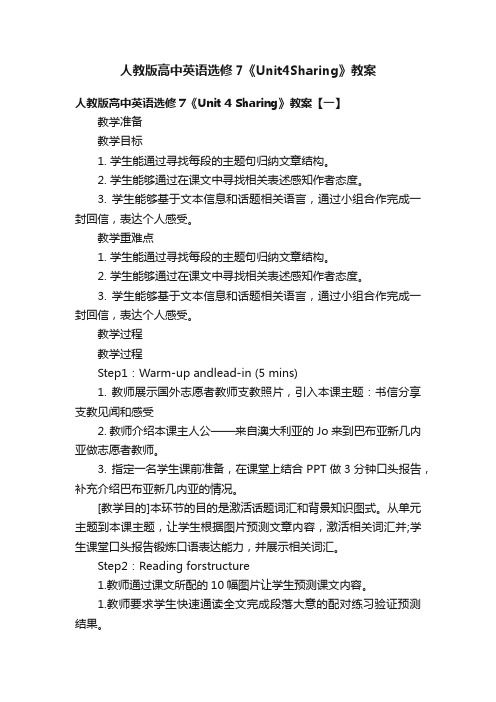
人教版高中英语选修7《Unit4Sharing》教案人教版高中英语选修7《Unit 4 Sharing》教案【一】教学准备教学目标1. 学生能通过寻找每段的主题句归纳文章结构。
2. 学生能够通过在课文中寻找相关表述感知作者态度。
3. 学生能够基于文本信息和话题相关语言,通过小组合作完成一封回信,表达个人感受。
教学重难点1. 学生能通过寻找每段的主题句归纳文章结构。
2. 学生能够通过在课文中寻找相关表述感知作者态度。
3. 学生能够基于文本信息和话题相关语言,通过小组合作完成一封回信,表达个人感受。
教学过程教学过程Step1:Warm-up andlead-in (5 mins)1. 教师展示国外志愿者教师支教照片,引入本课主题:书信分享支教见闻和感受2. 教师介绍本课主人公——来自澳大利亚的Jo来到巴布亚新几内亚做志愿者教师。
3. 指定一名学生课前准备,在课堂上结合PPT做3分钟口头报告,补充介绍巴布亚新几内亚的情况。
[教学目的]本环节的目的是激活话题词汇和背景知识图式。
从单元主题到本课主题,让学生根据图片预测文章内容,激活相关词汇并;学生课堂口头报告锻炼口语表达能力,并展示相关词汇。
Step2:Reading forstructure1.教师通过课文所配的10幅图片让学生预测课文内容。
1.教师要求学生快速通读全文完成段落大意的配对练习验证预测结果。
2.教师引导学生归纳出全文的整体结构。
[教学目的] 本环节的目的是让学生了解文章的整体结构。
不仅让学生学会寻找中心句,而且让学生从每个段落的中心句归纳出课文整体结构,让学生回顾信息交流类书信的写作结构。
Step3:Reading fordetails (10 minutes)1.教师要求学生先同桌配对合作,然后按照学习小组分组合作,仔细阅读文章细节找出信息,完成下列表格(划线部分是学生需要填出的部分):2.教师引导学生根据文章中的相关语言和信息体会作者的感情和态度。
高中英语Unit 4 Sharing 教学设计人教版选修七
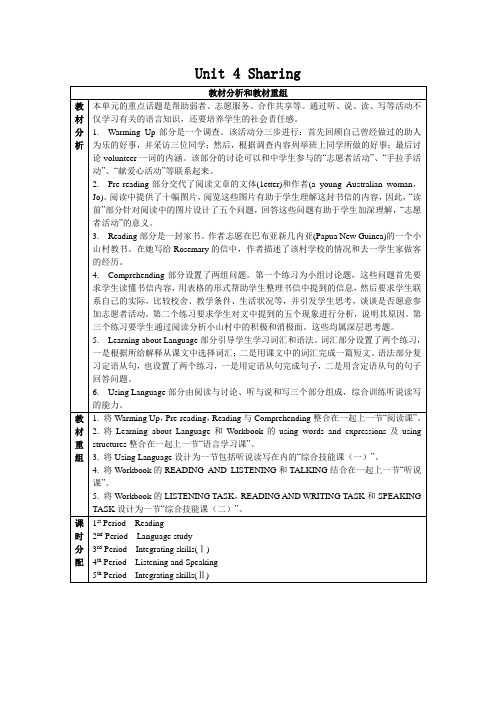
Unit 4 SharingPart 1: Teaching Design第一部分:教学设计Period 1: A sample lesson plan for reading(ALETTER HOME)AimsTo help students develop theirreading abilityTo help students learn aboutvoluntary workProceduresI. Warming up by defining volunteerWhat is a volunteer?1. One who enters into, or offers for, any service of his own free will.2. (Mil.) One who enters into service voluntarily, but who, when in service, is subject to discipline and regulations like other soldiers; -- opposed to conscript; specifically, a voluntary member of the organized militia of a country as distinguished from the standing army.II. Pre-readingHave you ever heard of a place called Papua New Guinea?Facts of Papua New GuineaCapital: Port MoresbyGovernment: constitutional monarchy with parliamentarydemocracyCurrency: kina (PGK)Area total: 462,840 sq kmland: 452,860 sq kmwater: 9,980 sq kmPopulation: 5,172,033 (July 2002 est.)Language: English spoken by 1%-2%, pidgin Englishwidespread, Motu spoken in Papua regionnote: 715 indigenous languagesReligion: Roman Catholic 22%, Lutheran 16%, Presbyterian/Methodist/London Missionary Society 8%, Anglican 5%, Evangelical Alliance 4%, Seventh-Day Adventist 1%, other Protestant 10%, indigenous beliefs 34%III. Reading for formsRead the text again to: cut/ the sentence into thought groups, blacken the predicates, darken the connectives and underline all the useful expressions.IV. Copying expressionsYou are asked to copy all the useful expressions into your notebook after class as homework.Expressions from A Letter Homethanks for…因……感谢, hear from…收到……的来信, be dy ing to do…急于做……, hear all about…了解所有关于……, include some photos附有几我照片, picture the places图象化这儿的地方, ask about…问讯关于……的信息, a bush school丛林学校, be made from…由……制成, walk to…步行到……, reach the school grounds走到学校操场, walk a long way走很长的路, sometimes up to two hours有时长达两小时, get to the school到达学校, adapt to…使适应……, one thing is for sure有一点是肯定的, become a lot more imaginative in…变得对……更富有想象力, a most challenging subject最富有挑战性的学科, carry…from…in a bucket用水桶把……带到……, show… a chemistry experiment向……演示……化学实验, bubble over everywhere到处冒气泡, come across…碰到……/见过……, jump out of the windows跳出窗外,V. Writing a letter of your own.Now you are to write a similar letter based on the topic, the words and the structures of the letter on page 29.VI. Closing down by reading more on voluntary workPeriod 2: A sample lesson plan for Learning about Language (Revise the Attributive Clause <restrictive>)AimsTo help students revise the Attributive Clause <restrictive> To help students discover and learn to use some useful words and expressionsTo help students discover and learn to use some useful structuresProceduresI. Warming up by reading the text aloud to the tapeAs a student, you know that reading aloud is important, and you probably feel frustrated if you don't read well. Now open your book to page 29 and read aloud the text A Letter Home to the tape.II. Discovering useful words and expressionsTurn to page 32 and do exercises 1 and 2.III. Revising useful structuresNow you may turn to page 32 to do exercises 1.You are to finish the sentence with your own words.Next you are going to do exercise 2 on page 32.IV. Closing down by making sentences with the Attributive ClausePeriod 3: A sample lesson plan for Using Language (THE WORLD’S MOST USEFUL GIFT CATALOGUE)AimsTo help students read the passage THE WORLD’S MOST USEFUL GIFT CATALOGUETo help students to use the language by reading, listening, speaking and writingProceduresI. Warming up by listening and reading to the tapeNow open your book to page 33. You are going to listening and reading to the tape, paying your attention to the pauses within the sentences.II. Reading for formsRead the text THE WORLD’S MOST USEFUL GIFT CATALOGUE again to: cut/ the sentence into thought groups, blacken the predicates, darken the connectives and underline all the useful expressions.III. Making sentences with the expressions from The World’sMost Useful Gift CatalogueNext you are going to making sentences using the expressions from The World’s Mos t Useful Gift Catalogue. You may include as many attributive clauses as possible.Expressions from The World’s Most Useful Gift Cataloguegive an unusual gift一份特殊的礼物, one’s loved one某人所爱的人, keep a gift保留礼物, a contribution towards…对……的捐助, choose… from this catalogue从清单中选……, a really useful gift for some of the world’s poorest送一个确实有用的礼物给世界上最穷苦的人, bring hope for a better future to…带去对未来的美好希望给……, a community in need需要帮助的社区, purchase an item购买一项礼物, send…an attractive card给……发送一个精美的卡片, send… to… 把……送给……, use the cards for any special occasion可以用在任何一种特殊的场合的礼物, purchase…from…从……购得……, train a whole village of around 40 families in new agricultural methods对整个大约40户人口的村庄进行新的农业生产方法的培训, provide seeds and simple agricultural equipment提供种子和简单的农业机械, just 20% more produce仅仅提高了20%的产量, mean the difference between sickness and health意味着患病与健康的差异, go hungry变的饥饿, provide for…为……提供,自己自足1.I was given an unusual gift by my loved daughter.2.I will keep the gift that was given to me by that blind man.3.This money will be a contribution towards those people who live in theWest of the country.4.You have to choose your school from the catalogue which was sent toyou last week.5. A really useful gift for some of the world’s poorest will bring hope for abetter future to them.6.Help must be offered to a community in need.7.You may purchase an item at our shop.8.I will send an attractive card to you.9.This letter will be sent to your special person.10.You may use the cards for any special occasion to purchase items from our shop.11.He was sent to train a whole village of around 40 families in new agricultural methods.12.Seeds and simple agricultural equipment will be provided.13.Just 20% more produce will mean the difference between sickness and health.14.The poor will go hungry this time next year.IV. Closing down by asking about volunteer workTo know more about volunteer work you may put as many questions as possible to your teacher.What is a volunteer project?Part 2: Teaching Resources第二部分:教学资源Section 1: Discourse studies of A LETTER HOMEType of writing and summary of A LETTER HOMESection 2: Background information for Unit 4 Sharing1. The five C’s in letter writingClear: Try not to beat around the bush when letter writing. Every word should come across as something that is understood. The best way to test this is to read what you wrote out loud, in a tape recorder, and play it back to yourself. Concise: Do not ramble. Try to make your words go straight to the point.Courteous: Remember that words can come across a lot harsher on paper. It’s best to save arguing to verbal usage, so thatyou can clear up any misunderstandings.Correct: Double check your spelling, grammar, and punctuation. There is nothing worse than trying to read a letter full of mistakes. It makes the clarity of the written word harder to decipher.Complete: Make sure that when you bring up a topic, you do not change topics in mid-stream. Make sure that you finish what you have to say before you go on to another topic.2. CULTURE SHOCK●Culture ShockWe can describe culture shock as the physical and emotional discomfort one suffers when coming to live in another country or a place different from the place of origin.●Symptoms:Sadness, loneliness, melancholyPreoccupation with healthAches, pains, and allergiesInsomnia, desire to sleep too much or too littleChanges in temperament, depression, feeling vulnerable, feeling powerlessAnger, irritability, resentment, unwillingness to interact with othersIdentifying with the old culture or idealizing the old countryLoss of identityTrying too hard to absorb everything in the new culture or countryUnable to solve simple problemsLack of confidenceFeelings of inadequacy or insecurityDeveloping stereotypes about the new cultureDeveloping obsessions such as over-cleanlinessLonging for familyFeelings of being lost, overlooked, exploited or abused。
人教 选修七 Unit4 Sharing 教案-精选教学文档
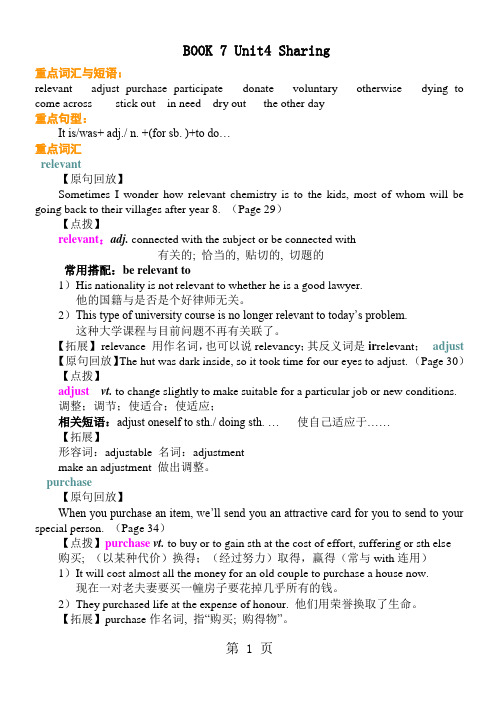
BOOK 7 Unit4 Sharing重点词汇与短语:relevant adjust purchase participate donate voluntary otherwise dying to come across stick out in need dry out the other day重点句型:It is/was+ adj./ n. +(for sb. )+to do…重点词汇relevant【原句回放】Sometimes I wonder how relevant chemistry is to the kids, most of whom will be going back to their villages after year 8. (Page 29)【点拨】relevant:adj. connected with the subject or be connected with有关的; 恰当的, 贴切的, 切题的常用搭配:be relevant to1)His nationality is not relevant to whether he is a good lawyer.他的国籍与是否是个好律师无关。
2)This type of university course is no longer relevant to today’s problem.这种大学课程与目前问题不再有关联了。
【拓展】relevance 用作名词,也可以说relevancy;其反义词是ir relevant;adjust 【原句回放】The hut was dark inside, so it took time for our eyes to adjust. (Page 30)【点拨】adjust vt. to change slightly to make suitable for a particular job or new conditions.调整;调节;使适合;使适应;相关短语:adjust oneself to sth./ doing sth. … 使自己适应于……【拓展】形容词:adjustable 名词:adjustmentmake an adjustment 做出调整。
英语选修7人教版:精品教案Unit 4 Sharing 学案(新人教版选修7)
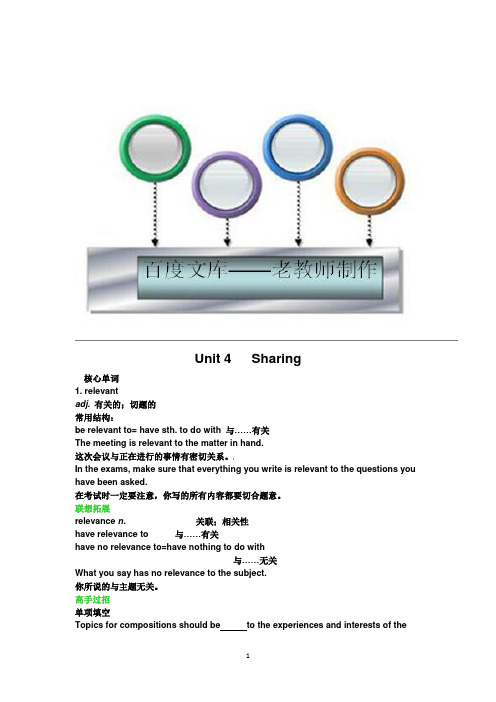
Unit 4 Sharing核心单词1. relevantadj.有关的;切题的常用结构:be relevant to= have sth. to do with 与……有关The meeting is relevant to the matter in hand.这次会议与正在进行的事情有密切关系。
In the exams, make sure that everything you write is relevant to the questions you have been asked.在考试时一定要注意,你写的所有内容都要切合题意。
联想拓展relevance n.关联;相关性have relevance to 与……有关have no relevance to=have nothing to do with与……无关What you say has no relevance to the subject.你所说的与主题无关。
高手过招单项填空Topics for compositions should be to the experiences and interests of thestudents.A. ConcernedB. dependentC. concerningD. Relevant解析:选D。
句意为:作文的题目应与学生的经历和兴趣有关。
be relevant to与……有关;而concerning 是介词,相当于about,后面不加to。
2. adjustvt.&vi.调整;使适合I usually adjust my watch before I go to work in the morning.我通常早上上班前校准我的表。
常用结构:adjust(sth./oneself)(to sth.)使适应;适应It seems that the newcomers have adjusted themselves in the schoo1.新来的同学看来适应了学校生活。
人教版高中英语选修七unit 4《sharing》period 4优秀教案(重点资料).doc
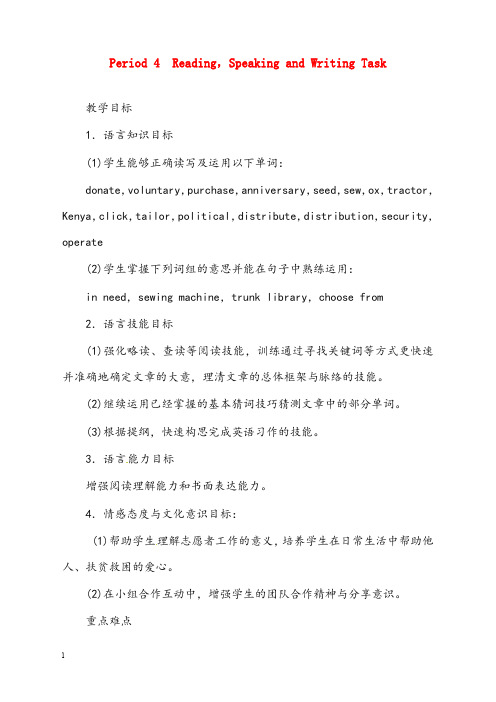
Period 4 Reading,Speaking and Writing Task教学目标1.语言知识目标(1)学生能够正确读写及运用以下单词:donate,voluntary,purchase,anniversary,seed,sew,ox,tractor,Kenya,click,tailor,political,distribute,distribution,security,operate(2)学生掌握下列词组的意思并能在句子中熟练运用:in need,sewing machine,trunk library,choose from2.语言技能目标(1)强化略读、查读等阅读技能,训练通过寻找关键词等方式更快速并准确地确定文章的大意,理清文章的总体框架与脉络的技能。
(2)继续运用已经掌握的基本猜词技巧猜测文章中的部分单词。
(3)根据提纲,快速构思完成英语习作的技能。
3.语言能力目标增强阅读理解能力和书面表达能力。
4.情感态度与文化意识目标:(1)帮助学生理解志愿者工作的意义,培养学生在日常生活中帮助他人、扶贫救困的爱心。
(2)在小组合作互动中,增强学生的团队合作精神与分享意识。
重点难点1.教学重点:阅读能力、写作能力的培养和提高。
2.教学难点:训练用英语获取信息、处理信息、分析问题和解决问题的能力;用英语说明自己学习生活情况的能力。
教学准备1.学生的学习准备:熟读本单元的单词词组,想一想如何用英语向别人介绍自己的情况。
2.教师的教学准备:查找“希望工程”的相关信息。
3.教学用具的设计和准备:制作与课文相关的多媒体课件。
教学过程Step 1 Pre-readingSeveral questions:1.What can we do for the children in poor areas or countries?2.Have you ever tried to send a gift or something to the children in poor areas or countries?How can you send the gifts to them?Now let's read the passage“The World's Most Useful Gift Catalogue”.[设计说明] 通过几个问题直接引入要学习的内容。
高中英语选修七Unit4《Sharing》 教案优选公开教案
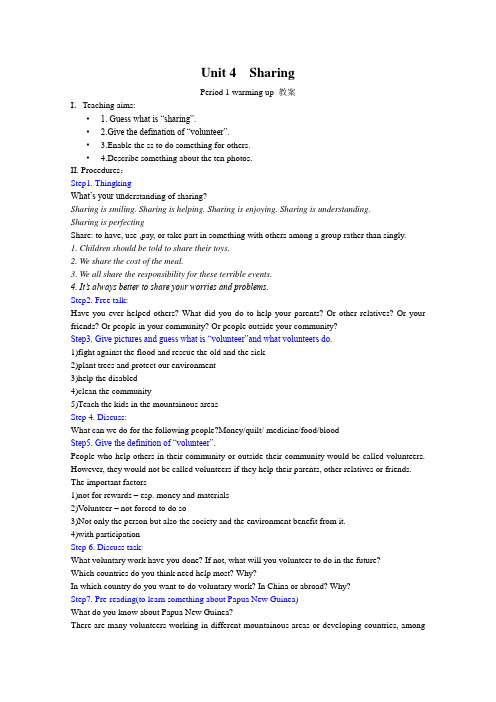
Unit 4 SharingPeriod 1 warming up 教案I.Teaching aims:• 1. Guess what is “sharing”.• 2.Give the defination of “volunteer”.• 3.Enable the ss to do something for others.• 4.Describe something about the ten photos.II.Procedures:Step1. ThingkingWhat’s your un derstanding of sharing?Sharing is smiling.Sharing is helping.Sharing is enjoying.Sharing is understanding.Sharing is perfectingShare: to have, use ,pay, or take part in something with others among a group rather than singly.1. Children should be told to share their toys.2. We share the cost of the meal.3. We all share the responsibility for these terrible events.4. It’s always better to share your worries and problems.Step2. Free talk:Have you ever helped others? What did you do to help your parents? Or other relatives? Or your friends? Or people in your community? Or people outside your community?Step3. Give pictures and guess what is “volunteer”and what volunteers do.1)fight against the flood and rescue the old and the sick2)plant trees and protect our environment3)help the disabled4)clean the community5)Teach the kids in the mountainous areasStep 4. Discuss:What can we do for the following people?Money/quilt/ medicine/food/bloodStep5. Give the definition of “volunteer”.People who help others in their community or outside their community would be called volunteers. However, they would not be called volunteers if they help their parents, other relatives or friends. The important factors1)not for rewards – esp. money and materials2)Volunteer – not forced to do so3)Not only the person but also the society and the environment benefit from it.4)with participationStep 6. Discuss task:What voluntary work have you done? If not, what will you volunteer to do in the future?Which countries do you think need help most? Why?In which country do you want to do voluntary work? In China or abroad? Why?Step7. Pre-reading(to learn something about Papua New Guinea)What do you know about Papua New Guinea?There are many volunteers working in different mountainous areas or developing countries, amongwhich Papua New Guinea(PNG) is one.Location: situated to the north of AustraliaPopulation: about 5.7 millionLanguage: English as the official languagePidgin English as the language for communicationEconomy: a poor country with most people living in tribal villages and depending on subsistence farming to make a living.Education: About 85% of children start school but only about 60% of these reach Year 5Step8. Give a brief description of the photos:Jo was a volunteer worked in Papua New Guinea (PNG) for two years.The following photos were taken by Jo in PNG. Look at the photos and answer the questions. Photos 1---31.What kind of student was in Jo’s class?Poorly dressed teenage boys2.Describe the classrooms.wooden pools, bamboo walls, grass roofs, grass on the floor, no glass in the windows3. What similarities and differences can you find between Jo’s and yours?Similarities: In a room with groupsdifferences: Jo’s classroom made of bamboo with grass roof and no windowsOurs made of bricks with glass windowsPhotos 4---101.What can you say about the village?The village is small. It’s by a river at the bottom of a valley. It has steep slopes all around it.2.What can you say about life in the village?The village huts are small. They have no widows and are made of wood, bamboo, and grass. The main crop is peanuts. The tool for planting is a digging stick. There is a bare-footed woman carrying a naked baby and a heavy bag on her shoulders.Step9. Homework:Ask Ss to work in groups and talk about the donations. If possible, encourage them to do for the poor children in poor areas in our country or in other countries.Unit4 SharingPeriod Two Reading教案I. Teaching aims:1. Enable t he Ss to learn more information about Jo’s job and the conditions of her teaching.2. Know more about the customs of local people.3. Discuss how you would do if you were a volunteer working in that area.4. Get more reading skills.II. Teaching procedure:Step 1: pre-reading:Give two questions:What was Jo’s job in PNG?What kind of students were in her class?Step2: Fast reading1. Jo is a young Australian women.2.Rosemary was dying to hear all about Jo’s life in Papua New Guinea.3. The boys walked a long way to get to the school.4. The boys and Jo didn’t have any textbooks.5. Jo became a lot more imaginative when teaching.6. The boys started jumping out the windows during a chemistry experiment.7. Jenny and Jo visited a village that was the home of one of the boys, Tombe.8. Kiak started crying “ieee ieee” to welcome them9. Mucap led us to a low bamboo hut.10. Kiak was going to share the platform with Jenny and Jo.11. Tombe’s family softly talked to each other in their language Jo didn’t understa nd.Step3. Do the judgement. (True or false according to the text)1. The classrooms are made of bricks and the roofs of grass.(F)2. It always takes the boys only a few minutes to get to the school.(F)3. Science is the most challenging subject for Jo.(T)4. When Jo and Jenny arrived at the village,they shook hands with all the villagers.(T)5. Tombe threw out the tin can because it’s very dirty.(F)Step4. Skimming and then answer the following questions:1.Why did Jo send Rosemary some photos?It’s difficult for Rosemary to imagine how life was hard / different in Jo’s ---2. Why was the high school called a bush school?The classroom were madeof bamboo and the roofs were made of grass.3. Were the boys and villagers friendly to Jo? How do you know?Lots of “good mornings” ; cry “ ieee ieee” ; shake hands4. Why was Science the most challenging subject for Jo?There was no equipment.5. Why did the boys start jumping out the window?The boy never came across something like bubbling mixture6. Why should it take Jo and Jenny two and a half hours to get to the village?They had to climb up a mountain to a ridge first and then down a steep path to the valley. Step5. Scanning and then anylize the structure of the text.Try to give the right order according to the contents of the text.2A .The condition of the school.1B An introduction.4C. The endingA. We had a meal and I saw a strange custom.B. The experiment frightened the boys.C. I am glad to receive Rosemary’s letter and I’ve included some photos.D. I left and I felt privileged.E. I saw the poor condition of the room.F. It’s a bush school and the students live far away.Step6. Detailed readingRead paragraph 1-3 and finish the questions1.Why does Jo call the high school a “bush school”2.Were the boys friendly to Jo? How do you know?3.How long does it take the students to go to school?4.Why was science the most challenging subject for Jo?5.Why did the boys start jumping out of the windows?6.Why does Jo wonder how relevant chemistry is to the kids?Read paragraph 1-3 and finish the questions1.Why does Jo call the high school a “bush school”Because the classrooms are made from bamboo and the roofs from grass.2.Were the boys friendly to Jo? How do you know?There are a lot of “good mornings” for Jo from the boys.3.How long does it take the students to go to school?Sometimes up to 2 hours4.Why was science the most challenging subject for Jo?There was no equipment.5.Why did the boys start jumping out of the windows?The boys never came across anything like the bubbling mixture.6.Why does Jo wonder how relevant chemistry is to the kids?Because most of the boys will go back to their villages after year 8 and she thinks chemistry may make little difference to the kids’ life.Step7. ComprehendingWhat have you learned about the customs and lives of the people in Tombe’s village? Read Jo’sStep8. Post-readingGuess the reasons for the facts according to the Jo’s letter.1. The boys jumped out of the windows in the science lesson.In the science lesson the boys were frightened by what they saw --- the mixture was bubbling over everywhere, thinking that something terrible had happened, so they jumped out of the windows to escape from danger.2. Jo wondered how relevant chemistry was to the boys.Because most of the boys will go back to their village after studying in the school, and their knowledge of chemistry will prove useless, so Jo wondered how relevant chemistry was to the boys.3. Tombe’s mother cried “ieee ieee” when he say Jo.I think it’s a kind of greeting in their village. And I’m sure all the family members will be happy and excited to have visitors like Jenny and Jo.4. There were no windows in Mukap’s hut.There were no windows in Mukap’s hut. Perhaps in this way can prevent flies, mosquitoes and other insects from coming in. Of course, if there were glass, they could both have a big window, and at the same time, they can keep all the insects from entering.5. The tin can was standing upside down on the grill.The tin can was standing upside down on the grill in order to get the leftover dry up quickly.Step9. Fill in the chart:What do you think are the positive and negative things about living in a village in Papua NewStep10. Discussion in groups:think you would have felt? Give reasons.First I think it was such a long distance from the school to Tombe’s home. Second, the family members and the villagers showed great hospitality to us, which impressed us very deeply. Third, we got the chance to know the villager’s simple life. Therefore, we were determined to go on with volunteer work to help the boys get enough education3.Why do you think Jo became a volunteer in PNG? Give as many possible reasons as you can. Would you like to work as a volunteer in a poor area?Give reasons.Useful phrases: be willing to; do one’s bit to do; be eager to do; be full of ; work hard and endure hardship…Key words: kind-hearted; helpful; strong-mindedA sample of the discussions:A: I think, first of all, Jo was a kind-hearted woman, who is willing to help others. Second, she knew enough about the poor conditions in PNG and thought that she could help teach in the schools. IfI am given the chance, I will do whatever I can to help.B: In my opinion, Jo must have worked as a teacher in Australia, and she applied to become a volunteer abroad, and then she was sent to PNG as a volunteer.C: Maybe she thinks that education is the key to solving all the problems in PNG, so she, as a teacher, goes to PNG to help.D: Perhaps she likes traveling abroad, helping the poor wherever she goes.E: I don’t agree with you. You know, she stayed there for two years. A traveler once d id that. She was willing to help the poor children in PNG to be educated. She was doing her bit to change thepoor’s state of living and education. Ifeveryone in the rich countries should do like her, all the problems stemming from poverty could be solved easily.F: I would like to say something about the second topic. I think I will be a volunteer in a poor area. Whenever I saw the poor living state of the poor in the western areas and mountainous areas, I was eager to do something for them. All are create d equal. But they can’t get what we can enjoy. What a pity! If possible, I will try to helpStep11.Homework:Surf the Internet to find some information about the volunteers working in poor areas.Unit 1 Living WellPeriod 3 Learning about language 教案I.Teaching aims:1. Guess words according to the word meaning.2. Fill in the blanks of a given passage.3. Learn important words , phrases and some important sentence stuctures.II.ProceduresStep 1 Do exercise for Ex.1 on page32Find words in the unit that have the following meanings.1.___to change slightly to make something work better (adjust)2 ____ a metal shelf for cooking meat, toasting bread, etc (grill)3 ____ connected with what is being done or discussed (relevant)4 ____ an idea(concept)5 ____ an honour(privilege)6 _____something that has been organized(arrangement )7. ____written work in an office, such as writingreports or letters(paperwork)8. ____ to breathe air into your nose noisily(sniff)Step2 Complete the paragraph with words or phrases below in their proper form.Sharon looked at herself in the mirror and sighed. She had posted the airmail letter to Tim last week but had had no reply.She smoothed her hair down with a wet comb, wiped her muddy shoes, and thought about the three months she had known her. He was the nicest boy she had ever met. Otherwise she would not have fallen in love with him. She still remembered that he adjusted quickly when he heard she came from a remote village. At first she had heard from him every week but now she had not heard for a fortnight. Why? She had decided to find out. She walked down the platform to catch the train to New York feeling both excited. and nervous. She was dying to see him again but what if he didn't want to see her?Step3 Look at these definitions and make suitable phrasal verbs with the words in the right box. Then make a dialogue using each one.out; off; up; from; for; up; down; of; to1( dry out) to become complete dry.2(dry up) to become dry on the surface.3(dry off) to come to an end4(hear out) to listen to somebody till the end5(hear from) to receive a letter or a phone call from someone6(hear of )to have knowledge of sb/ sth7(be dying to ) to want to do something very much8(die out ) to disappear or stop existing completely9(die down ) to graduallyy get quieterStep4 Learn important words , phrases and some important sentence stuctures.1.It was wonderful to hear from you.hear from sb. = receive a letter from sb. 收到某人的信hear of ,hear from & hear aboutHave you heard from Charles recently?I never heard of a man with the name Tom.I have heard much about Beckham.2. I know you’re dying to hear all about my life here.be dying to do / for sth. 渴望做某事;迫切想要She is dying to go abroad.I am dying for a glass of water.“渴望”的类似说法be thirty for sth./ desire to do sth./ have a strong desire for sth./ long to do for sth.3. Many of them have walked a long way, sometimes up to two hours, to get to the school.up to = as many as/ as much asHe can earn up to $50,000 a year.up to 还可以表示(1) up until 一直She lived at home right up to / until she got married.(2) good enough for sth. 胜任I am not sure if she is really up to that job.(3)由……负责It’s up to her to decide whether or not to go on the course4. The boys who had never come across anything like this before started…..come across 偶然遇见/发现I came across some interesting books in the room.I came across an old friend I hadn’t seen for years.come about 发生This situation should never have come about.come along 进展How is your work come along?5. imaginative adj.富有想象力的,爱想象的an imaginative child/writerimaginary adj.想象中的,假想的imagine v.设想imaginable adj.可想象的image n.雕像,肖像imagination n.想象力a man of rich imagination词语辨析:Imaginative: showing new and exciting ideas富于想象力的;创新的We need imaginative people to put new energy into the team.Imaginary: existing only in your mind or imagination想象中的The story is wholly imaginary.imaginable:(与形容词最高级或与all,every连用,表示强调或概括)想象得到的;可想象的The house has the most beautiful views imaginable.6.Sometimes l wonder how relevant chemistry is to these students,most of whom will be going back to their villages after Year 8 anyway1)relevant 有关的;有实际重要性的(be relevant to sth./sb.)His age is not relevant to whether he is a good teacher.他的年龄与他是否是一位好老师无关。
精编教案--高二英语选修七教学设计unit4sharing
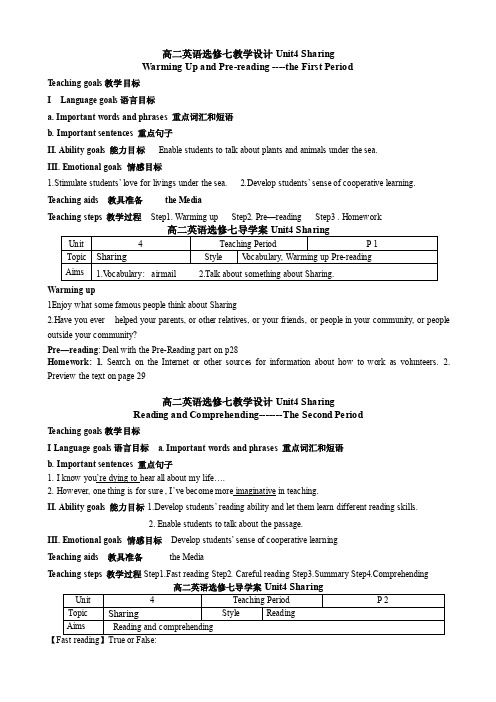
高二英语选修七教学设计Unit4 SharingW arming Up and Pre-reading ----the First PeriodT eaching goals教学目标I Language goals语言目标a. Important words and phrases 重点词汇和短语b. Important sentences 重点句子II. Ability goals 能力目标Enable students to talk about plants and animals under the sea.III. Emotional goals 情感目标1.Stimulate students’ love for livings under the sea.2.Develop students’ sense of cooperative learning.T eaching aids 教具准备the MediaT eaching steps 教学过程Step1. Warming up Step2. Pre—reading Step3 . HomeworkWarming up1Enjoy what some famous people think about Sharing2.Have you ever helped your parents, or other relatives, or your friends, or people in your community, or people outside your community?Pre—reading: Deal with the Pre-Reading part on p28Homework: 1. Search on the Internet or other sources for information about how to work as volunteers. 2. Preview the text on page 29高二英语选修七教学设计Unit4 SharingReading and Comprehending-------The Second PeriodT eaching goals教学目标I Language goals语言目标 a. Important words and phrases 重点词汇和短语b. Important sentences 重点句子1. I know you’re dying to hear all about my life….2. However, one thing is for sure , I’ve become more imaginative in teaching.II. Ability goals 能力目标1.Develop students’ reading ability and let them learn different reading skills.2. Enable students to talk about the passage.III. Emotional goals 情感目标Develop students’ sense of cooperative learningT eaching aids 教具准备the MediaT eaching steps 教学过程Step1.Fast reading Step2. Careful reading Step3.Summary prehending【Fast reading】True or False:1)The classrooms are made from bricks and the roofs from grass.2)It always takes the boys only a few minutes to get to the school.3)Science is the most challenging subject for Jo.4)When Jo and Jean arrived at the village, they shook hands with all the villagers.5)Tom be threw out the tin can because it’s very dir ty. (FFTTF)【Careful reading】l. Why does Jo call the school where he teaches a bush school?A. Because the school was built in a bush.B. Because the classrooms are made from bamboo and the roofs from grass.C. Because there is nothing but bushes around the school.D. Because students in that school use "bush" as their names.2. Which of the following statements is RIGHT?A. There is no electricity but enough water at school.B. I can become used to the school' s condition easily.C.The students there often do chemistry experiments.D.We have neither textbooks nor any experiment equipment.3. Which of the following sentences are RIGHT about Mukap' s house?a. It is a low bamboo hut with grass sticking out of the roof and this shows it' s a woman' s house.b. There were no windows and the doorway was just big enough to get through.c. The hut was dark inside so it took time for our eyes to adjust.d. Fresh grass had been laid on'the floor but there was an old platform.e. That night Kiak-aras going to share the platform with us.A. abeB. bcdC. bceD. cde4.What can you say about the village?The village was a place full of natural beauties. There are more trees and bamboos.5. What can you say about life in the village? People in the village lived a simple life.【Homework】高二英语选修七教学设计Unit4 SharingLanguage points ---The Third PeriodT eaching goals教学目标I Language goals语言目标a. Important words and phrases 重点词汇和短语b. Important sentences 重点句子1.I know you’re dying to hear all about my life….2. However, one thing is for sure , I’ve become more imaginative in teaching.3. Otherwise, they do n’t waste anything.II. Ability goals 能力目标1.Get students to use some useful new words and expressions correctly.2.Enable students to make sentences after the useful sentence patterns.III. Emotional goals 情感目标1.Stimulate students’ interest in learning English.2.Develope students’ spirit of cooperating and teamwork.T eaching aids 教具准备:the MediaT eaching steps教学过程Step1.Greetings Step2.Revision:vocabulary.Step3. Language points Step4. Exercises【词汇重现】Review words and expressions in unit4.【学习新知】见新新学案P45—P49知识点。
英语高二年级人教版新课标选修7Unit4Sharing教案
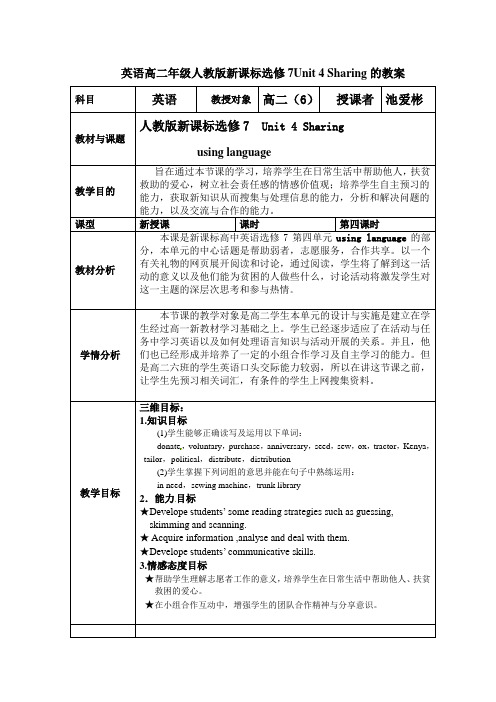
英语高二年级人教版新课标选修7Unit 4 Sharing的教案科目英语教授对象高二(6)授课者池爱彬教材与课题人教版新课标选修7Unit 4 Sharingusing language教学目的旨在通过本节课的学习,培养学生在日常生活中帮助他人,扶贫救助的爱心,树立社会责任感的情感价值观;培养学生自主预习的能力,获取新知识从而搜集与处理信息的能力,分析和解决问题的能力,以及交流与合作的能力。
课型新授课课时第四课时教材分析本课是新课标高中英语选修7第四单元using language的部分,本单元的中心话题是帮助弱者,志愿服务,合作共享。
以一个有关礼物的网页展开阅读和讨论,通过阅读,学生将了解到这一活动的意义以及他们能为贫困的人做些什么,讨论活动将激发学生对这一主题的深层次思考和参与热情。
学情分析本节课的教学对象是高二学生本单元的设计与实施是建立在学生经过高一新教材学习基础之上。
学生已经逐步适应了在活动与任务中学习英语以及如何处理语言知识与活动开展的关系。
并且,他们也已经形成并培养了一定的小组合作学习及自主学习的能力。
但是高二六班的学生英语口头交际能力较弱,所以在讲这节课之前,让学生先预习相关词汇,有条件的学生上网搜集资料。
教学目标三维目标:1.知识目标(1)学生能够正确读写及运用以下单词:donate,voluntary,purchase,anniversary,seed,sew,ox,tractor,Kenya,tailor,political,distribute,distribution(2)学生掌握下列词组的意思并能在句子中熟练运用:in need,sewing machine,trunk library2.能力目标★D evelope students’ some reading strategies such as guessing, skimming and scanning.★ Acquire information ,analyse and deal with them.★Develope students’ communicative skills.3.情感态度目标★帮助学生理解志愿者工作的意义,培养学生在日常生活中帮助他人、扶贫救困的爱心。
人教版高中英语选修7优秀教案Unit4SharingPeriod 4新
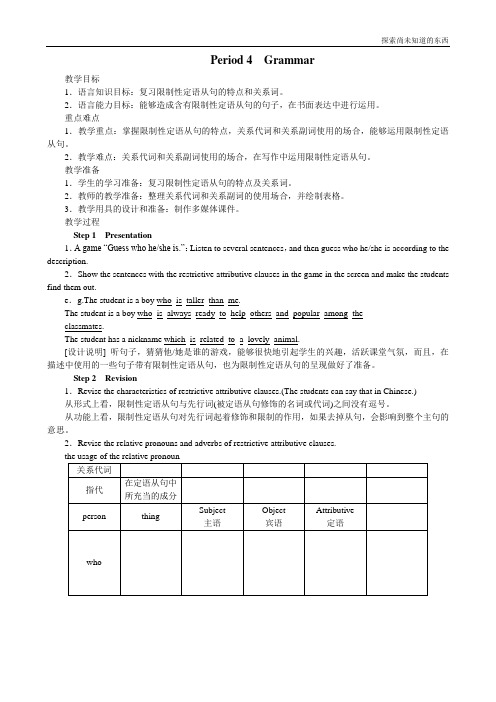
Period 4Grammar教学目标1.语言知识目标:复习限制性定语从句的特点和关系词。
2.语言能力目标:能够造成含有限制性定语从句的句子,在书面表达中进行运用。
重点难点1.教学重点:掌握限制性定语从句的特点,关系代词和关系副词使用的场合,能够运用限制性定语从句。
2.教学难点:关系代词和关系副词使用的场合,在写作中运用限制性定语从句。
教学准备1.学生的学习准备:复习限制性定语从句的特点及关系词。
2.教师的教学准备:整理关系代词和关系副词的使用场合,并绘制表格。
3.教学用具的设计和准备:制作多媒体课件。
教学过程Step 1Presentation1.A game “Guess who he/she is.”:Listen to several sentences,and then guess who he/she is according to the description.2.Show the sentences with the restrictive attributive clauses in the game in the screen and make the students find them out.e.g.The student is a boy who_is_taller_than_me.The student is a boy who_is_always_ready_to_help_others_and_popular_among_the_classmates.The student has a nickname which_is_related_to_a_lovely_animal.[设计说明] 听句子,猜猜他/她是谁的游戏,能够很快地引起学生的兴趣,活跃课堂气氛,而且,在描述中使用的一些句子带有限制性定语从句,也为限制性定语从句的呈现做好了准备。
Step 2Revision1.Revise the characteristics of restrictive attributive clauses.(The students can say that in Chinese.)从形式上看,限制性定语从句与先行词(被定语从句修饰的名词或代词)之间没有逗号。
高中英语人教版选修七教案:Unit+4单元教案

Unit 4 SharingI.教学内容分析本单元的中心话题是济贫扶弱、志愿服务、合作共享。
教学目的是让学生认识到社会上贫富、强弱的差异和帮助别人的意义,帮助学生树立同情弱者、救困济贫的思想。
Warming Up部分通过对同学进行采访的小组活动,了解同学们平时帮助别人的方式。
最后讨论自愿帮助和志愿者的不同,从而引出下文的阅读课文。
Pre-reading部分介绍了阅读课文的背景知识。
Reading部分是一封家书。
作者是一个到巴布亚新几内亚教书的志愿者。
文中介绍了巴布亚新几内亚农村的教育和生活状况,描述了到一个学生家做客的经历。
Comprehending部分设置了三个练习,目的在于让学生逐层加深对课文的理解。
Learning about Language部分突出了词汇和语法的学习与训练。
本单元的语法是复习限制性定语从句,特别是用that不用which的情况。
Using Language部分中包括了听、读、写三个部分的内容。
阅读部分介绍了一个出售特殊礼物、帮助发展中国家的网页。
听力部分通过记者对一个志愿者的采访,让学生更多地了解发展中国家,培养学生助人为乐的精神。
学习用时间表达法叙述事件是本听力练习的重点。
Summing Up部分要求学生对本单元所学的知识进行总结和评价,以找出不足之处,从而改进。
Learning Tip部分建议学生要积极参加小组活动,以练习口语,培养交际能力。
II.教学重点和难点1. 教学重点(1) 本单元的生词和短语;(2) 系统掌握运用限制性定语从句。
2. 教学难点(1) 认识帮助别人的重要性;(2) 学会发表评论和表达自己的看法;(3) 学会以时间为线索,叙述人物生平。
III.教学计划本单元建议分六课时:第一课时:Warming up, Pre-reading, Reading & Comprehending第二、三课时:Learning about Language第四课时:Reading and discussing (Using Language)第五课时:Listening and speaking (Using Language)第六课时:Reading task (Workbook), Speaking task (Workbook) & Writing task(Workbook)IV.教学步骤:Period 1 Warming up, Pre-reading, Reading & ComprehendingTeaching Goals:1. To help Ss to learn the importance of helping others and the ways to help others.2. To help Ss to learn about the educational and living conditions of some developing countries and develop their awareness of helping those in need.3. To teach how to use the new words and phrases in the text.Teaching Procedures:Step 1. Leading-in1. Lead Ss to the content of this unit. Teacher may say, “We have all heard about Lei Feng, who was ready to help others and set us an example. We live our own lives. Everybody has his own work to do. Why must we help others?”2. Get some Ss to present their opinions on the question above before the class.Suggested Answer:Nobody can do everything alone, no matter how powerful he is. Nobody never meets with trouble, no matter how well he is going. So everybody needs others’ help. But we cannot alwaysreceive but never give. We must give in return for what we receive. We give help because we have been helped. Since we were born, we have received a lot from the society. So we should return it. We give help today, but we may need help tomorrow. Even if we may not see a person again, by helping him, we can let him know help is necessary and important for those who are in need. By helping each other, people can feel that life is full of warmth and friendliness and is worth living. In a word, to help others is to help oneself.Step 2. Warming Up1. Ask Ss to discuss the following question.In what ways do we help the people around?2. Ask Ss to work in groups of four and one of them to interview the other three. Tell him to ask the questions in Ex1 of Warming Up on P28. Then get one pair to act out their dialogues before the class.3. Divide Ss into four groups and ask them to discuss the following question.Can we call the person who helps others a “volunteer”?Suggested Answer:When one of your parents or friends needs help, you may not be asked to help but you volunteer to help, we don’t say you are a volunteer. A volunteer is a person who helps others in or outside his community or in a foreign country.Step 3. Pre-readingPurpose: To get Ss prepared for the reading text.1.Ask Ss to look at the pictures on P29~P30 and guess what the passage talks about.2.Ask Ss to describe the students and their classrooms in the pictures. After that, let Ss imaginetheir living conditions.3. Lead Ss to the reading text. Teacher may say, “Today we are going to read a letter written by an Australian volunteer, Jo, who taught for two years in Papua New Guinea, a country to the south of Australia.”Step 4. SkimmingPurpose: To help Ss get the general idea of the letter.1.Ask Ss to listen to the tape and try to get the main idea of the text.Suggested Answer:In the letter, the writer wrote about the educational and living conditions in PNG and her experience of visiting a student’s village.2.Play the tape paragraph by paragraph and let Ss read after it. Then ask them to sum up themain idea of each paragraph with only one sentence.Suggested Answer:Para.2: The school is simply built and far away from the students’ homes.Para.3: The educational conditions are very poor.Para.4: I visited a village of one of my student’ and received a warm welcome.Para.5: I stayed with the student’s family and their huts were poorly equipped.Para.6: I had a meal with the student’s family and they cooked in an unusual way.Para.7: I returned from the visit and felt greatly rewarded.Step 5. ScanningPurpose: To help Ss get a deeper understanding of the text..1. Ask Ss to find out the relationship of the people mentioned in the text. Teacher may say, “There are some persons mentioned in the text. Can you name them? Can you find out who they are?” Suggested Answers:Jo — the writer of the letter.Rosemary — the person who Jo is writing to.Tombe — one of the writer’s boy students, whose family Jo visitedJenny — the writer’s fellow workerKiak — Tombe’s motherMukap — Tombe’s father2. Ask Ss to read the text carefully and ask them the following questions. It is better to read them out to Ss than to present them on the blackboard. Encourage Ss to keep the eyes away from the books when they answer the questions.(1)What is the school like?(2)Is the writer popular with her students? How do you know?(3)What is the writer’s difficulty in teaching?(4)Why did the students jump out of the windows?(5)Why does the writer wonder if she is making any difference to her students’ lives?(6)Was the writer warmly welcomed by the villagers? How do you know?(7)Do Mukap and Kiak usually sleep in the same house?(8)Where did the writer and Jenny sleep that night?(9)Why did Tombe throw away the tin can?Suggested Answers:(1)It is made of bamboo and the roofs are made of grass. It is from away from Ss’ homes.(2)Yes. When she gets to school, the students all say hello to her.(3)There is no electricity or water and they have no textbooks. There is no teachingequipment.(4)Because they had never seen such an accident and were frightened.(5)Because most of her students will go back to their villages to work in the field and shethought what they have learnt will be of no use.(6)Yes. Because Tmbe’s mother welcomed her by crying “ieee ieee” and the villager allshook hands with her warmly.(7)No. They sleep in their own huts.(8)They slept on a newly-made platform in Mukap’s hut.(9)Because they think throwing away the tin can is in fact throwing away evil spirits.Step 6. Language point1. Ask Ss to work in pairs and underline and translate the following phrases in the text.hear from, be dying to do sth., up to, adapt to, the other day, before I knew it, come across, make a difference to sb., get to know, shake hands with sb., stick out of, get through, a newly made platform, a couple of, build a fire, leave…to do sth., dry out, dry up, fall into bed2. Lead Ss to deal with some more language points.(1) be dying to do sth (line 2, para1): want very much to do sth, have a strong desire to do sth.I am dying to know what has happened. 我迫切想知道发生了什么。
人教版高中英语选修7教案Unit 4 Sharing

人教版高中英语选修7教案Unit 4SharingUnit4Sharing一、语言要点I单元要点预览(旨在让同学整体了解本单元要点)词汇部分词语辨析1.imaginative/imaginable/imaginary2.dryup/dryout3.otherwise/therefore/however词形变化 1.operatev.操作,动手术operatorn.操作员,接线员,operationn.运转,操作,实施 2.donatev.捐赠,赠予donationn.捐赠品,捐款,贡献 3.arrangev.安排,排列,arrangementn.排列,安排4.adjustv.调整,调节adjustableadj.可调整的adjustmentn.调整,调节,调节器5.participatev.参与,分享,participantn.参与者,participationn.分享,参与重点单词1.adjustvt.&vi.调整;使适合.2.participatevi.参与;参加.3.otherwiseadv.用别的方法;其他方面.Adv&conj.否则;不然4.arrangementn.安排;排列.5.donatevt.捐赠.6.purchasevt.&n.买;购买.7.distributionn.分配;分发;分布状态.8.relevantadj.有关的,相应的9.operatev.操作,运转,开动,起作用重点词组dyingto.极想;渴望.theotherday几天前stickout.伸出inneed.在困难中;在危急中.重点句型1.whenIreachtheschoolgroundstherearelotsof “goodmorning”formefromtheboys.2.youaskedwhetherI’mgettingtoknowanylocalpeople.3.Thegiftcoversthecost ofexercisebooksandtextbooksforcommunityprimaryschoo lsthatoperateinpoororremotevillages.重点语法限制性定语从句II词语辨析1).imaginative/imaginable/imaginaryadj.【解释】imaginative富有想象力的,创新的imaginable可想象得到的imaginary想象中的,虚构的【练习】选择imaginative/imaginable或imaginary并用其适当的形式填空1)Althoughthemaincharactersinthenovelaresotruetolif e,theyare_______.2)It’s_______forsuchan_______writertocreate_______storie s.3)Thisistheonlysolution_________.4)Thefamouspoemwasfroman______poet.keys:1)imaginary2)imaginable;ima ginative;imaginary3)imaginable4)imaginative2).dryup /dryout【解释】dryup使完全变干;(河流,湖泊等)干涸dryout变干,干透【练习】选择dryup或dryout,并用其适当的形式填空1)Thefarmerspumpedwatertotheirfieldstostopthesoil__ ______.2)Thepool________inthelateautumn.3)Thevillag ershadtowaitforthesunto_________thedirtroad.4)Don’tleavethevegetableonthetable,oritwill________.keys: 1)dryingout2)driesup3)dryup4)dryout3)otherwise/ther efore/however【解释】otherwise否则;不然thereforeadv.因此,所以however无论如何,可是【练习】选择otherwise/therefore或however并用其适当的形式填空1)Hedidn'tworkhardatEnglish_______hewouldn'tfinditd ifficulttolearnnow.2)wedonothaveenoughmoney._____ ____wecannotaffordtobuythenewcar.3)Thefirstpartwas easy;thesecond,________,tookhours.4)Heisnoisy,but________aniceboy.5)weweregoingtoplayfootball,butitwassohotthatwedecidedtodo_____________.keys:1 )otherwise2)Therefore3)however4)otherwise5)otherwiseIII词性变化(旨在提供语法填空所需材料)1.operatev.操作,动手术operatorn.操作员,接线员,operationn.运转,操作,实施2.donatev.捐赠,赠予donationn.捐赠品,捐款,贡献 3.arrangev.安排,排列,arrangementn.排列,安排 4.adjustv.调整,调节adjustableadj.可调整的adjustmentn.调整,调节,调节器5.participatev.参与,分享,participantn.参与者,participationn.分享,参与【练习】根据句子结构,用括号内所提供词的适当形式填空1)Theyencouragedthe_______to_______inthesingingperf ormanceafterthecontest..2)Thedoctorare________onan______ofafactorywhogotinjuredwhen_______amachine,and the________issaidtolastovertenhours.3)Theseatsinthe planeare________,andyoucan________themtoacertainang le.The______isnotdifficulttomake.4)Thedrinkswere________tothembycocacolacompanyandtheyreceived_______f romothercompaniesaswell.5)ourdepartmentwillbeinchar geof_______theconference.wouldyoupleasegiveussomesu ggestionsonthe_______forit?keys:1)participants;part icipate2)operating;operator;operating;operation3)ad justable;adjust;adjustment4)donated;donation5)arran ging;arrangementIV重点词汇(旨在提供综合运用所需材料)1.adjustvt.&vi.调整;使适合.[重点用法]adjustmentn.调整;修正adjustableadj.可调节的;可调整的adjust使适应;适应。
(最新)人教高中英语选修七 单元教案Unit Four Sharing
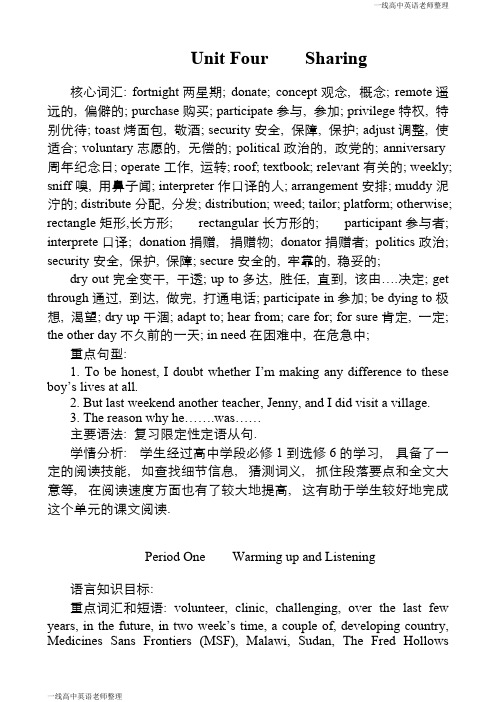
Unit Four Sharing核心词汇: fortnight两星期; donate; concept观念, 概念; remote遥远的, 偏僻的; purchase购买; participate参与, 参加; privilege特权, 特别优待; toast烤面包, 敬酒; security安全, 保障, 保护; adjust调整, 使适合; voluntary志愿的, 无偿的; political政治的, 政党的; anniversary 周年纪念日; operate工作, 运转; roof; textbook; relevant有关的; weekly; sniff嗅, 用鼻子闻; interpreter作口译的人; arrangement安排; muddy泥泞的; distribute分配, 分发; distribution; weed; tailor; platform; otherwise; rectangle矩形,长方形; rectangular长方形的; participant参与者; interprete口译; donation捐赠, 捐赠物; donator捐赠者; politics政治; security安全, 保护, 保障; secure安全的, 牢靠的, 稳妥的;dry out完全变干, 干透; up to多达, 胜任, 直到, 该由….决定; get through通过, 到达, 做完, 打通电话; participate in参加; be dying to极想, 渴望; dry up干涸; adapt to; hear from; care for; for sure肯定, 一定; the other day不久前的一天; in need在困难中, 在危急中;重点句型:1. To be honest, I doubt whether I’m making any difference to these boy’s lives at all.2. But last weekend another teacher, Jenny, and I did visit a village.3. The reason why he…….was……主要语法: 复习限定性定语从句.学情分析: 学生经过高中学段必修1到选修6的学习, 具备了一定的阅读技能, 如查找细节信息, 猜测词义, 抓住段落要点和全文大意等, 在阅读速度方面也有了较大地提高, 这有助于学生较好地完成这个单元的课文阅读.Period One Warming up and Listening语言知识目标:重点词汇和短语: volunteer, clinic, challenging, over the last few years, in the future, in two week’s time, a couple of, developing country, Medicines Sans Frontiers (MSF), Malawi, Sudan, The Fred HollowsFoundation, The Cancer Council, Youth in the City, go blind, belief Why did Mary decide to work in a developing country?In the Sudan, why was it nearly impossible for Mary to get to the clinics when the rains came?Why were conditions in the clinics in the Sudan challenging?语言技能目标: 通过听一段采访, 了解默里夫妇作为一个志愿者为Medicines Sans Frontiers工作的经历, 提高学生听前预测, 注意细节信息等听力方面的技能.情感态度和文化意识目标: 借助听力材料, 让学生自己思考是否会像莫里夫妇那样做志愿服务工作. 把学生的实际和所听到的内容结合起来, 培养学生正确的价值观.教学重点: 1) 学会边听边注意听力材料中的细节信息, 并作笔记.2) 在讲述个人生平时, 常采用时间表达法. 学会关注对话中的时间表达法以及出现的先后次序.教学难点: 1) 根据列表掌握听力材料中的细节信息. 2)学习采用时间表达法来表述一个人的生平.Step 1 Lead-inLead in the new text by asking some questions:1. Some questions1) Have you ever helped others?2) What did you do to help your parents, your friends or your relatives?2. Make a class list of the different things our classmates do for each of the groups on the survey form.3. Discuss whether someone who helps the groups on the survey form can be called a “volunteer”?Step 2 Pre-leadingTurn to Page 35, read Exercise 1 and 2 in Listening and speaking, predict what you will hear in the listening material.Step 3 Listening1. Listen to the passage and then fill in the blanks.Time Place EventThe 1980s199219972001NowFuture2. Listen to it again and answer some questions.1) Why did Mary decide to work in a developing country?________________________________________________________.2) When Mary worked in a clinic in Malawi, why did the children die?_______________________________________________________.3) In the Sudan, why it nearly impossible for Mary to get to the clinics when the rains came?________________________________________________________.4) Why were conditions in the clinic in the Sudan challenging?________________________________________________________.5) Why does Mary enjoy her job?________________________________________________________.Step 4 Listening on Page 70Listen to the materials on Page 70 and then finish the exercises in the workbook.Step 5 Homework1. Finish off the exercises.2. Look for more information about MSF on Internet and share it with your partners.Period Two Pre-reading and Reading语言知识目标:1. 正确理解和运用下列单词: airmail; fortnight; roof; muddy; textbook; concept; weekly; relevant; remote; weed; rectangle; rectangular; adjust; platform; broom; tin; jar; sniff; participate; interpreter; grill;otherwise; privilege.2. 重点词组: hear from, be dying to; the other day; dry out; dry up语言技能目标:强化略读, 查读等阅读技能, 训练通过寻找关键词, 主题句等方式更快速地准确确定文章的段落大意, 理清文章的总体框架与脉络; 运用已经掌握的基本猜词技巧猜测文章中的部分单词.语言能力目标: 增强阅读理解能力; 发展借助图片, 表格等非语言信息进行语言输出的能力.重难点:1. 获取巴布亚新几内亚独立国各部落生活状况和风俗习惯的信息; 阅读能力的培养和阅读技巧的训练, 如精读课文完成表格填空.2. 理解作为志愿者工作的意义, 从而树立正确的价值观; 训练用英语获取信息, 处理信息, 分析问题和解决问题的能力.Step 1 Warming up1. Show the sign of United Nations Volunteer in China.从整体上看,标志是一颗爱心的造型,同时还是英文“青年”首写字母“Y”的样貌。
- 1、下载文档前请自行甄别文档内容的完整性,平台不提供额外的编辑、内容补充、找答案等附加服务。
- 2、"仅部分预览"的文档,不可在线预览部分如存在完整性等问题,可反馈申请退款(可完整预览的文档不适用该条件!)。
- 3、如文档侵犯您的权益,请联系客服反馈,我们会尽快为您处理(人工客服工作时间:9:00-18:30)。
人教版Module 7 Unit 4 Sharing《单元回归—评价单》课题:Revision【基础训练】I. Vocabulary1._____________(n.)观念;概念2._____________(adj.) 有关的;切题3._____________(adj.) 遥远的;偏僻的4._____________(vi.& vt.) 调整;(使)适5._____________(conj.)否则;不然6._____________(n.) 安排;排列7._____________(vt.& n.) 买;购买8._____________(n.) 周年纪念(日)9.________(vt.& vi.) (使)发出咔嗒声(n.) 咔嗒声10.________(n.) 安全;保护;保障11._____________(vi.)参与;参加_____________(n.)参加;参与_____________(n.)参加者12._____________(vt.)捐赠_____________(n.)捐赠,捐款_____________(n.)捐赠者13._____________(adj.)自愿的;志愿的;无偿的___________(n.& vi.)自愿者;志愿者;自愿做……14._____________(vt.)分配;分发_____________(n.)分布状态;分配;分发15.__________(vi.)工作;运转;(vt.)操作___________(n.)手术;运转_____________(n.)操作人Ⅱ. Phrases1._____________接收……的信2._____________ 不久前的一天3._____________ (指河流、井等)干涸4._____________ 适应5._____________ 诚实的说6._____________ 通过7.set up _____________ 8.(be) dying to do _____________ 9.dry out _______________________________ 10.in need ____________________ 11.come across _____________ 12.stick out _____________III、Sentences1.The other day I _____ ____ the boys the weekly chemistry experiment ______, before I knew it, the mixture was bubbling over everywhere!不久前一天,我正在给男孩子们做每周一次的化学实验的表演,我还没有反应过来,这时混合剂就到处冒泡了!【仿写】昨晚我正在看电视,这时他来拜访我。
__________________________________________________________________________________ 2.To be honest,I ________________ I’m making any difference to these boy’s lives at all.1说实在的,我真的不知道我教的课是否会让这些孩子的生活有所改变。
【仿写】我怀疑他们两天内能否完成这项艰巨的任务。
___________________________________________________________________________________ 3.The gift you give is _____ something your loved one keeps ______ a voluntary contribution towards the lives of people who really need it.你送的礼物不是给你所爱的人留念的,而是给那些确实有生活需要的人的一项志愿性捐助。
【仿写】重要的不是说了什么而是做了什么。
___________________________________________________________________________________ 4.We walked for two and a half hours to get there—first up a mountain to a ridge ______ ______we had fantastic views and then down a steep path to the valley below.我们步行两个半小时才到达那里——先是爬山,爬到山脊能看到奇妙的景色,然后走下一个陡坡,一直走到下边的山谷。
【仿写】我们爬到山顶,在那儿我们可以一览整个城市。
___________________________________________________________________________________ 5.______ was such a privilege ___________________________________________________.跟汤贝一家度过了了一天,真是一种荣幸。
【仿写】能够和你交谈是很大的荣幸。
___________________________________________________________________________________【语境训练】Ⅰ.单词拼写1.You want to be a teacher.But do you have the________(相关的) experience?2.The small village was quiet and________(遥远的) from the busy life of the city.3.It's reported that Jackie Chen has________(捐赠) a great amount of money to the charity.4.Education is a________(特权,优待)in many countries.5.Besides studying at school,he often________(参加)in some out-of-school activities.6.My uncle________(购买)a new house near the lake last year.7.All his books are well ________(安排)on the bookshelf in his study.8.This work costs us nothing;it's all done by________(志愿者).Ⅱ. 短语填空dry up,hear from,dry out,in need,be dying to,come across21.Being abroad for so many years,I always look forward to________my family.2.The exam was over yesterday and I________know the result of the exam now.3.On my way home yesterday,I________my former classmate and we had a very good time.4.The pool in the backyard________in the late autumn.5.In the west of China,the hot sun in summer and cold winds in winter can soon________ your skin.6.Those famous singers are performing and are collecting money for the persons________.III.单句改错1.She was dying to see him again but how if he doesn’t want to see her?2.Bill Gates made a generous donation for the charity.3.I do invite Mr.Green to the party that day, but he forgot it completely.4.After he studied aboard, he went on operating on the company.5.The parents were shocked by the news which their son needed an operation on his knee.6.We shall visit the college where his father teaches there.7.I know the reason that she looks so worried.8.He left me the book, that was very useful for me.9.This is the room which food is kept.10.April 15, 1976 is the day when we’ll never forget.【语篇训练】话题语法填空Yesterday I ________ (hear) from a little girl who lives in a remote mountain village. In the letter, she told me that she ___________ (operator) the machines herself. Although her village’s economy is relatively falling behind, her family’s financial income is above the average, so they often ________ (donation) money or objects to the families _____ need or distribute food and clothes to the poor villagers. She also wants to do some voluntary jobs in the future.Her schools is an old ruined rectangular hut, _______ roof is made of weeds, and whose walls are made pf mud. In the classroom, the platform is just a large piece of wood. They don’t have enough ________ (textbook) and they have no concept of _______ (do) experiments. They only learn some subjects that are relevant to their life, but she is dying _______ learn more knowledge. She wants to be _______ interpreter in the future, so she participates _______ all kinds of activities, for example,3anniversary ceremonies, political lectures and so on.I hope I will help her in the near future.微写作(提示:划线字体部分用本单元词汇表达。
